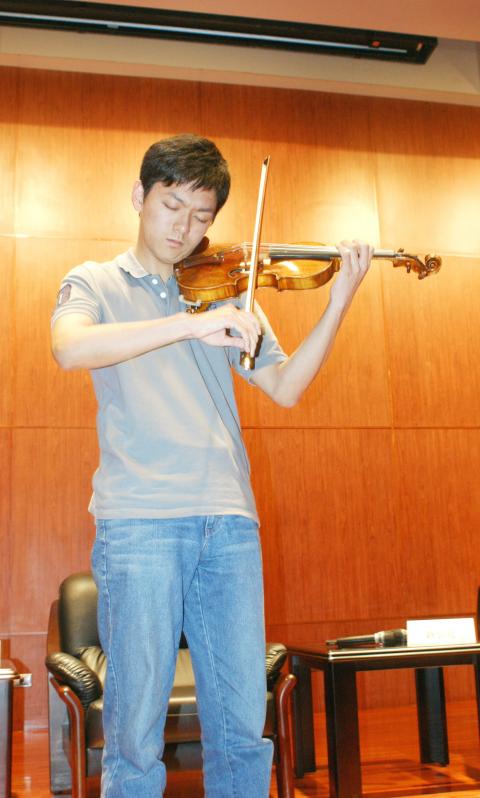Violinist Tseng Yu-chien is not only the youngest person to ever receive the Chi Mei Arts Award, he has actually won the award twice. At the age of 17, he has already won a number of international violin competitions with his profound musicality. Most recently he won fifth place in Belgium’s Queen Elisabeth Music Competition. He will be going back to Belgium to attend the Concert Prelude to National Day 2012. On July 2, the Chi Mei Museum lent the “ex-Castelbarco-Tarsio” Guarneri violin, which is worth more than NT$100 million (US$3.334 million), to him to play at the concert so he can continue using his superior musicianship to make Taiwan proud.
Tseng did not start learning the violin until the age of five. Prior to learning the violin, while he was in a preschool music class, they found that he could not distinguish pitches, even after several attempts. His musical aptitude was therefore thought to be much lower than that of his peers. His teachers were worried he might have a hearing impairment, so his parents took him to the hospital to run some tests.
The tests showed that he did not have any hearing problems, so his father enrolled him in a percussion class to improve his musical sensibilities. He started learning violin only after a friend of his father’s recommended the instrument, which was when his natural musical talent was finally unleashed and started to take off. At the age of seven, Tseng won first place in a Taipei music competition, and after just two years he became a national champion. Since then he has won numerous international competitions and has been called a child prodigy.

Photo: Wu Chun-feng, Liberty Times
照片:自由時報記者吳俊鋒
Tseng’s journey with the violin has been full of unanticipated glory and success. His natural musical talent has been nurtured under the guidance of his parents and teachers. After beating all of the competition in Taiwan, he won third prize in the junior division of the Yehudi Menuhin Competition in France at the age of 11, and also became the youngest person to ever receive the Chi Mei Arts Award that same year.
He was accepted into the Curtis Institute of Music at the age of 13. During his time there as a student, Tseng has won the junior division of the Philadelphia Orchestra’s Albert M. Greenfield Concerto Competition in 2009, first prize in the Pablo Sarasate Competition that same year, the Prize in memory of Dr. Enrico Costa and the Friends of Paganini Association Prize at the Paganini Competition in 2010, a Jury Discretionary Award at the International Tchaikovsky Competition last year, which was also when he received his second Chi Mei Arts Award.
The violin that the 17-year-old Tseng had initially hoped to borrow from the Chi Mei collection for the competition in Belgium — Giuseppe Guarneri del Gesu’s 280-year-old “ex-Castelbarco-Tarsio” violin, — was already on loan to renowned violinist Hu Nai-yuan, so he borrowed the “ex-Lafont-Sikovsky” violin instead, which was also made by Guarneri.

Photo: Wu Chun-feng, Liberty Times
照片:自由時報記者吳俊鋒
Tseng took a trip down south to Greater Tainan on July 2 to return the “ex-Lafont-Sikovsky” Guarneri violin to the museum, thank them for letting him borrow it, and once again ask if he could borrow the “ex-Castelbarco-Tarsio,” which he played on the spot after finally realizing his long-desired wish to borrow the instrument. Tseng will be taking the violin to Belgium to perform as a soloist with the Belgium National Orchestra on July 20 at the Concert Prelude to National Day 2012, once again displaying the brilliant musicianship of a gifted Taiwanese musician.
(Liberty Times, Translated by Kyle Jeffcoat)
兩度贏得奇美藝術獎、並創下最年輕得主紀錄的曾宇謙,才十七歲,就以「絕對音感」在小提琴的國際賽事中連戰皆捷,日前更拿下比利時伊莉莎白國際大賽第五名,將應邀參加當地的國慶音樂會演出,奇美博物館七月二日再度出借價值新台幣上億元的「塔里希奧」名琴,希望他能繼續以優異的表現,為台灣爭光。
曾宇謙五歲才開始學小提琴,其實在這之前,他上幼兒園的唱遊課時,無法辨別音高,屢教不會,比起同齡的小孩,對音樂的領悟落後很多,更一度讓師長懷疑是否耳朵有問題,父母還帶往醫院進行聽力檢查。
經檢查,曾宇謙的聽力並沒有問題,父親就讓他接觸打擊課程,學習音感,在朋友的推薦下,改練小提琴,天賦被啟蒙,甚至完全開發,七歲榮獲台北市音樂比賽第一名,才過兩年,又贏得全國冠軍,日後更揚威海外,因此有神童的美譽。
曾宇謙的小提琴之路堪稱無心插柳,在父母、師長的努力栽培下,天賦發揮得淋漓盡致,打遍國內無敵手之後征戰海外,十一歲拿下法國曼紐因國際青少年小提琴比賽第三名,也首度獲得奇美藝術獎,是歷屆最「幼齒」的得主。
曾宇謙十三歲考上美國寇蒂斯音樂院,就讀迄今,期間獲得費城管弦樂團協奏曲比賽第一名、西班牙薩拉沙泰國際小提琴比賽第一名與最佳演奏獎、義大利帕格尼尼國際小提琴比賽協奏曲最佳演奏獎、俄國柴可夫斯基國際小提琴比賽評審團特別獎,去年第二度獲頒奇美藝術獎。
十七歲的曾宇謙在伊莉莎白國際大賽時,原本想借製琴大師耶穌.瓜奈里兩百八十年前的傑作「塔里希奧」,但被名家胡乃元先借用,就改以同是瓜奈里打造的「拉楓特」出征。
曾宇謙七月二日專程南下歸還拉楓特,感謝奇美相助之外,也商借塔里希奧,現場拉奏,一償宿願,本月二十日將前往比利時參加國慶音樂會與比利時國家交響樂團一起演奏,再度展現台灣人的精湛琴藝。
(自由時報記者吳俊鋒)

For many people in Taiwan, childhood memories of rural life include pig pens standing beside family homes. Leftover rice, vegetable scraps and soup from daily meals were poured into buckets and fed to pigs. This practice of feeding pigs with household food waste was once a common way of life, both an economic choice and an expression of agricultural society’s deep respect for conserving resources. From a practical standpoint, pigs are omnivorous animals capable of efficiently digesting food scraps that humans can no longer eat. For rural households, food waste cost almost nothing, yet it could be converted into pork, a

Tango unfolds in a dimly lit room, where a haunting melody ushers two dancers into a close embrace. Here, music and movement merge into a silent yet passionate conversation, expressing longing, memory and shared purpose. What makes tango truly magical is the deep interaction and spontaneous improvisation between partners. Tango began in the late 19th century in Buenos Aires, Argentina’s bustling capital. Born in the poor working-class neighborhoods and busy port areas, this dance emerged from a melting pot of cultures. European immigrants, African slaves and local residents all contributed to its unique character. From these rich influences, tango

A: What show are you watching online? B: I’m watching “Fly Me to the Moon & Back” – an exhibition launched by the Taipei Music Center (TMC) to commemorate the late singer Tom Chang. A: Known for his sky-high notes, Chang is praised as one of the best singers in the 1990s. His death at the age of 31 was a major loss indeed. B: And I’m so glad that we went to the TMC’s 90s-themed concert last Friday. I finally saw the iconic “Godmother of Rock” WaWa perform live. A: This year-end show also featured singers Princess Ai, Bii, Wayne Huang, PoLin and

Continued from yesterday(延續自昨日) https://www.taipeitimes.com/News/lang The loss of sea stars significantly impacts the ocean ecosystem. Sea stars are important __6__ that help control populations of mussels and sea urchins. Among them, the sunflower star is one of the largest and fastest sea stars and is adept at preying on sea urchins. Without sea stars, sea urchins can __7__ in numbers and devastate kelp forests. These forests are essential __8__ for many marine animals and also help capture carbon from the atmosphere, which is vital in the fight against climate change. The mystery behind SSWD is still __9__, but it is clear that